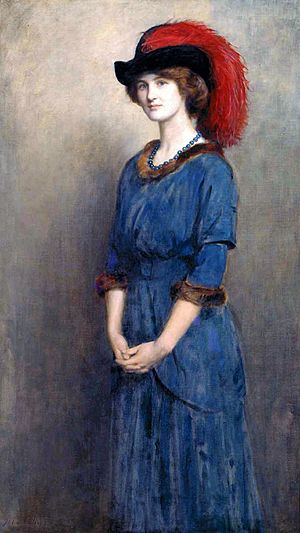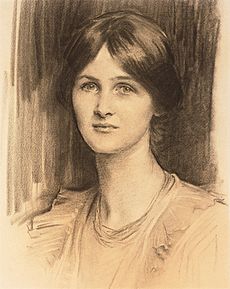Angela Thirkell facts for kids
Angela Margaret Thirkell (pronounced THUR-kel; born Mackail, 30 January 1890 – 29 January 1961) was a famous English and Australian writer. She also wrote one book, Trooper to Southern Cross, using the pen name Leslie Parker.

Contents
Early Life and Family
Angela Margaret Mackail was the older daughter of John William Mackail (1859–1945). He was a Scottish expert in classical studies and worked for the government. He was also a professor of poetry at Oxford University from 1906 to 1911.
Her mother, Margaret Burne-Jones, was the daughter of the famous artist Edward Burne-Jones. This made Angela Thirkell a cousin of the writer Rudyard Kipling and politician Stanley Baldwin. Her brother, Denis Mackail, was also a novelist. Angela was known for being tall and for being in charge of her younger cousins and siblings. They even called her AKB, which stood for "Angela Knows Best."
Angela went to school in London at the Froebel Institute and St Paul's Girls' School. She also studied in Paris at a special school for young ladies.
Marriages and Children

After returning from Paris, Angela met James Campbell McInnes, a professional singer. They got married in 1911. Their first son, Graham, was born in 1912. Their second son was the writer Colin MacInnes. A third child, Mary, was born in 1917 but sadly passed away that same year. Angela then divorced her husband.
In December 1918, Angela married George Lancelot Allnut Thirkell (1890–around 1940). He was an engineer from Tasmania, Australia. In 1920, they moved to Australia with Angela's two sons. Their son, Lancelot George Thirkell, was born there. He later became a manager at the BBC.
Life in Melbourne, Australia, was very different for Angela. In November 1929, she decided to return to England with her youngest son, Lancelot George. She said her parents needed her, but she also preferred the life in London. Her second son, Colin, followed her to England later. However, Graham stayed in Melbourne.
Writing Career
Angela Thirkell started writing in Australia because she needed money. She published an article in a magazine in 1921. This was the first of many articles and short stories she wrote, including some for Australian radio. When she returned to England in 1929, she continued writing for newspapers, children's stories, and then novels.
Her success as a novelist began with her second book, High Rising (1933). Most of her novels were set in Anthony Trollope's fictional English county called Barsetshire. She often used ideas and names from other books, and she frequently quoted from authors like Charles Dickens and Jane Austen. Angela published a new novel every year.
Her books from the 1930s were often funny and made fun of village life, rich people, and middle-class dreams. For example, Pomfret Towers gently poked fun at these things. Three Houses (1931) was a short book about her childhood. It showed her clear writing style and how much she admired her grandfather, Edward Burne-Jones.
Trooper to the Southern Cross (1934) was about English and Australian passengers on a ship returning to Australia after World War I. It showed the spirit of Australian soldiers, known as 'diggers.' They were independent but also very loyal.
In the 1940s, her books were influenced by World War II. They showed how people, especially women, dealt with life on the home front. Books like Cheerfulness Breaks In and Northbridge Rectory described how housewives managed daily problems during wartime. These books, including Marling Hall and Growing Up, give a lively picture of British women's attitudes and struggles during the war.
Later books in the 1950s became more romantic. The Old Bank House showed her thoughts on the rising merchant class. Her final book, Three Score and Ten, was not finished when she died. It was later completed by C. A. Lejeune. Thirkell was good at noticing small details of everyday life and understanding society.
Many people consider Thirkell's books to be in the "comedy of manners" style, similar to Jane Austen. This means her books often use humor to show how people behave in society. Her humor was well-known during her time. The magazine Punch called her "one of the great humorous writers of our time." The famous humorist P.G. Wodehouse also praised her books.
Selected Books
Barsetshire Chronicles
- High Rising (1933)
- Wild Strawberries (1934)
- The Demon in the House (1934)
- August Folly (1936)
- Summer Half (1937)
- Pomfret Towers (1938)
- The Brandons (1939)
- Before Lunch (1939/1940)
- Cheerfulness Breaks In (1940)
- Northbridge Rectory (1941)
- Marling Hall (1942)
- Growing Up (1943)
- The Headmistress (1944)
- Miss Bunting (1945)
- Peace Breaks Out (1946)
- Private Enterprise (1947)
- Love Among the Ruins (1948)
- The Old Bank House (1949)
- County Chronicle (1950)
- The Duke's Daughter (1951)
- Happy Returns (1952)
- Jutland Cottage (1953)
- What Did It Mean? (1954)
- Enter Sir Robert (1955)
- Never Too Late (1956)
- A Double Affair (1957)
- Close Quarters (1958)
- Love at All Ages (1959)
- Three Score and Ten (1961)
Other Books
- Ankle Deep (1931)
- Trooper to the Southern Cross (1934; republished as What Happened on the Boat)
- O These Men, These Men! (1935)
- The Grateful Sparrow (1935)
- The Fortunes of Harriet (1936)
- Coronation Summer (1937)
 | Janet Taylor Pickett |
 | Synthia Saint James |
 | Howardena Pindell |
 | Faith Ringgold |

